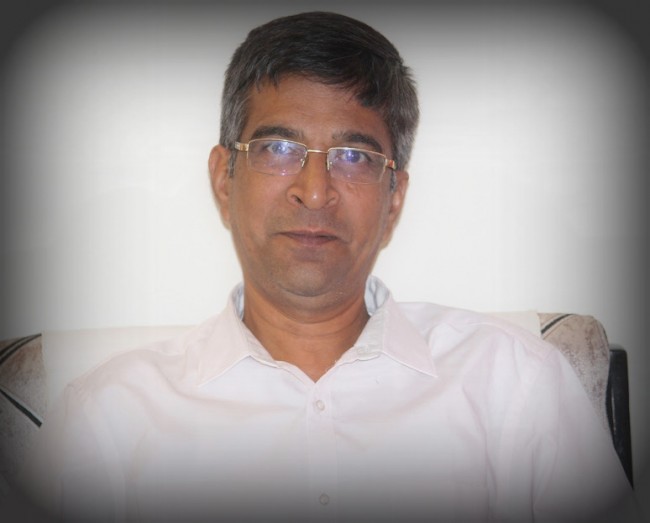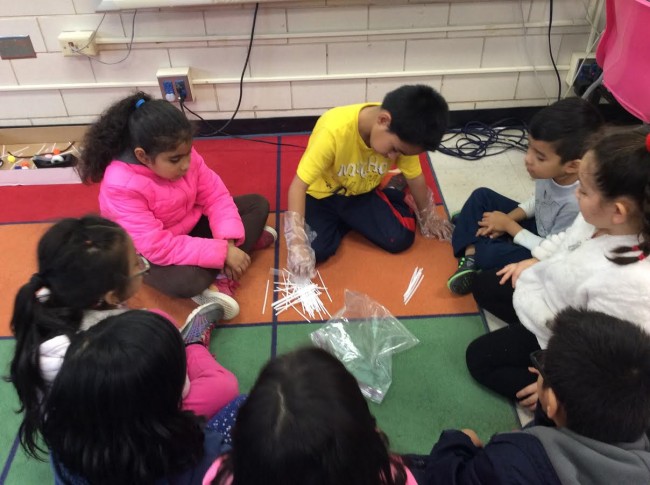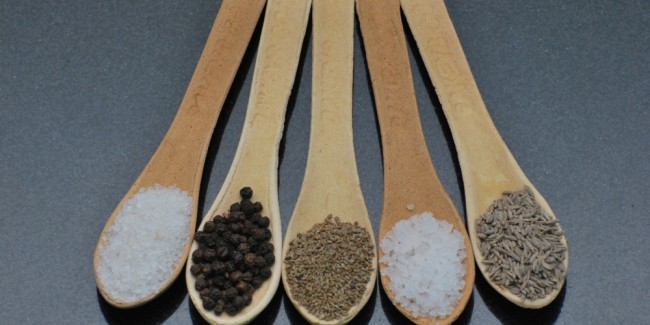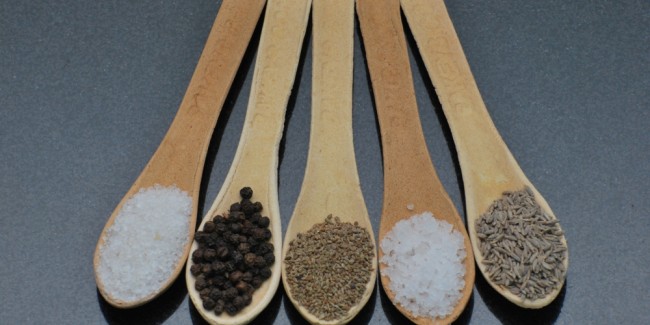BY SUPRIYA D.G.
Atlanta, GA, February 2, 2017: When Grade 1 students at Henderson Mill Elementary School,Atlanta, a STEM certified school, contacted the creator of edible cutlery for a project, they were bridging the gap between education and science, innovation and conservation, and walking the powerful path of civic mindedness.
In several ways, the journey of Narayana Peesapaty, founder of Bakeys Edible Cutlery has been a work in progress, like the recycling project of the children at Henderson Mill. Serendipity and uncertainty are the recurring themes in scientific discoveries as history would have us know.
For Peesapaty, this Eureka moment was when he noticed several passengers scooping up their food with “Papad”, a crispy Indian snack served with meals, instead of using their plastic forks and spoons. This explanation came by way of an email response to questions from the Henderson school children, by Peesapaty’s wife Pradnya Keskar, who has taken on the task and role of managing communications for the company. She goes on to explain that in that instant he developed the idea of creating a spoon with Sorghum and some other grains, to mix and give it a shape of a spoon, soup spoon, chop stick so that one could use and eat it too.

Keskar reminisces about Peesapaty’s initial foray and experiments, underscoring the learning, the continuous failures and never-say-die attitude and the luck that enabled the eventual realization of a dream.
“For a man who struggled to make a cup of tea even”, she writes, “he started experiments in the kitchen after his job and could actually make spoons and other cutlery shapes successfully. Later, he experimented with various moulds and a variety of flour mix combinations to be sure he could make it a commercial venture and start manufacturing spoons to sell as a small business. He started his own company towards the end of 2006 and left his job to pursue his dream project full time.”
Keskar further explains that Peesapaty’s scientific background and work in the areas of researching ground water, power sector reforms, forestry, agriculture in India and policies in the aforementioned areas as well as rural development and rural livelihoods, forest products, post harvest products since 1992 laid the groundwork for his innovation. However, when he was researching semi arid tropic crops, he realized that debilitating economic practices and harsh realities in the agricultural industry contributed to the decline of productivity and desperate measures by poor farmers, she adds.
Bakeys Facts
*Started in 2006 with 10-15 daily wage women workers. Since 2016, 24×7 production, with 28 female and male employees.
*A short film on Change Makers of Asia by Discovery Channel in 2008 also made Peesapaty known worldwide.
*Heavy losses and no market forced Bakeys to look for a buyer.
*In August 2015 www.thebetterindia.com wrote a blog on Edible cutlery. Sponsored by Marico Foundation, it was shown on their webpage and FB page.The film generated tremendous interest and likes.
*A bank notice claiming Peesapaty’s apartment by 20 March 2016 made things financially worse.
*Crowd funding idea In India through Ketto and in USA though Kickstarter generated orders from 38 countries
*US websites closed on account of massive orders and manual production enabled barely 5000 spoons a day.
*The company does not sell spoons anymore. Orders between 23 March 2016 to 31st May 2016 are still being delivered. A total of 3400000 spoons.
*Spoons are- sweet (with sugar), plain and savory with any combinations like- ginger, garlic, salt and pepper, carom seed, cumin seed, cardamom, cinnamon. Colouful and highly nutritious spoons are made using pulps of beetroot (reddish), carrot (Orange) and spinach (green). Do not make spoons with cocoa and chocolate combination as they look and taste burnt and are black. One can dip the spoons in strawberry/ vanila, chocolate sauce.
*Spoons should not be stored next to pulses and grains. The bugs in these can damage the spoons.
*Pets may mistake edible cutlery for a chewy toy.
*Spoons that smell bad should be put out in the sun or microwaved before use.
In an email interview with NRI Pulse, Peesapaty talked about how he arrived at the point of self-realization and the strong need to act, challenged by his earlier work experiences and encounter with the devastating forces of climate change.
He writes, “It was the longest wait I had for recognition of the product and its purpose, followed by market pull and most importantly finance. I knew it was not money that I chased but the deep rooted concern that plastic will one day become a monster beyond control, that the farmers will give up crops that fed them healthy meals and ground water will be the most precious thing in the whole world.”
Despite a failed partnership, loss of trust from family and friends, closure was not an option. The project to find a solution for society’s misuse of an ethical way of living became a mission, he adds.
Yet, juggling roles as a scientist, a businessman, conservationist and an entrepreneur-cum -innovator has been tough for Peesapaty.
“I thought I was master juggler and can do anything and all the roles belonged to me. The realization dawned on me when I could see the lacunae in technology that needed urgent attention and no one except me knew at that point what exactly I wanted the machine to perform. We had no money to create and pay a team. Workers became part of my tech journey and my wife managed several issues with three other volunteers.”
Since November 2016, Peesapaty has turned his attention to developing and improving technology to enable large scale production. Having designated responsibilities, Peesapaty concurs that after nine years he feels sorted out as a scientist. “Innovation, R & D and the patience, perseverance and unending trials and errors come more easily to me rather than the trials to become a businessman which was a mistake, as one needs a different mindset to do business and I now know I don’t have one.”
Entrepreneurial success has not diminished Peesapaty’s disregard for ecology and conservation. He sees the challenges of accepting a new healthy behavior. “It is neither an easy nor a comfortable one, as we are in a comfort zone. Ventures like mine are many, and each one has his/ her struggle as these are change makers for the betterment of mankind” he says. He cautions that although a few may not have a commercial agenda, every venture has its own script.
“Conservation is not a main agenda of most countries, wars and extracting all that one can for quick gains is. So in such a scenario entrepreneurship is a hard journey, one needs unending self-confidence, persistence and a thousand failures to swallow before one stroke of success” he reiterates.
Peesapaty is hopeful of education as a means to leverage innovation and generate ecological consciousness. Reacting to the Henderson Mill Elementary School’s project on conservation by using less plastic and minimizing garbage, he says “I am glad the school children are thinking and willing to act at their own levels, be it within school or in the family or neighborhood. This trend is been in several schools now across the world. The teachers are taking it upon themselves to make children aware and also to take it up as a practice/ practical project to inculcate an experiential education. I certainly favor such moves by schools as the generation for who I created this product is made a part of my journey now. What else can I ask for? We have spoilt our life with indulgences and recklessness but let us do something positive and long lasting to make our kids healthy, happy and caring for one another and nature. When I saw a primary school book of Taiwan carrying Bakeys as a lesson in science curriculum I was thrilled and convinced that my message has reached the right target. I think it will also be in five other nations that Edible cutlery is going to be a part of school curriculum lesson in science book. These are like permanent markers and it stays in the minds of children who the nation is shaping up”.

Meanwhile, in a Skype conversation with this writer, Ms Tahtinen’s First Grade class at Henderson expressed their dismay at the 912 plastic forks and straws that they had collected in a week. They have been graphing their findings and working with the idea of reducing the use of plastic. They are pursuing their attempt to Skype with Narayana Peesapaty and exploring the possibility of using edible cutlery in their cafeteria. These students have brought a way forward to encourage an ethical minded pursuit of science that is both meaningful and beneficial to the world.





3 comments
[…] Eat your spoon and save the world BY SUPRIYA D.G. Atlanta, GA, February 2, 2017: When Grade 1 students at Henderson Mill Elementary School, Atlanta, a ST […]
[…] of science that is both meaningful and beneficial to the world.This article was first published on NRIPulse#wp-subscribe.wp-subscribe-1{background:#f5f5f5}#wp-subscribe.wp-subscribe-1 […]
I like very much. I also done this business